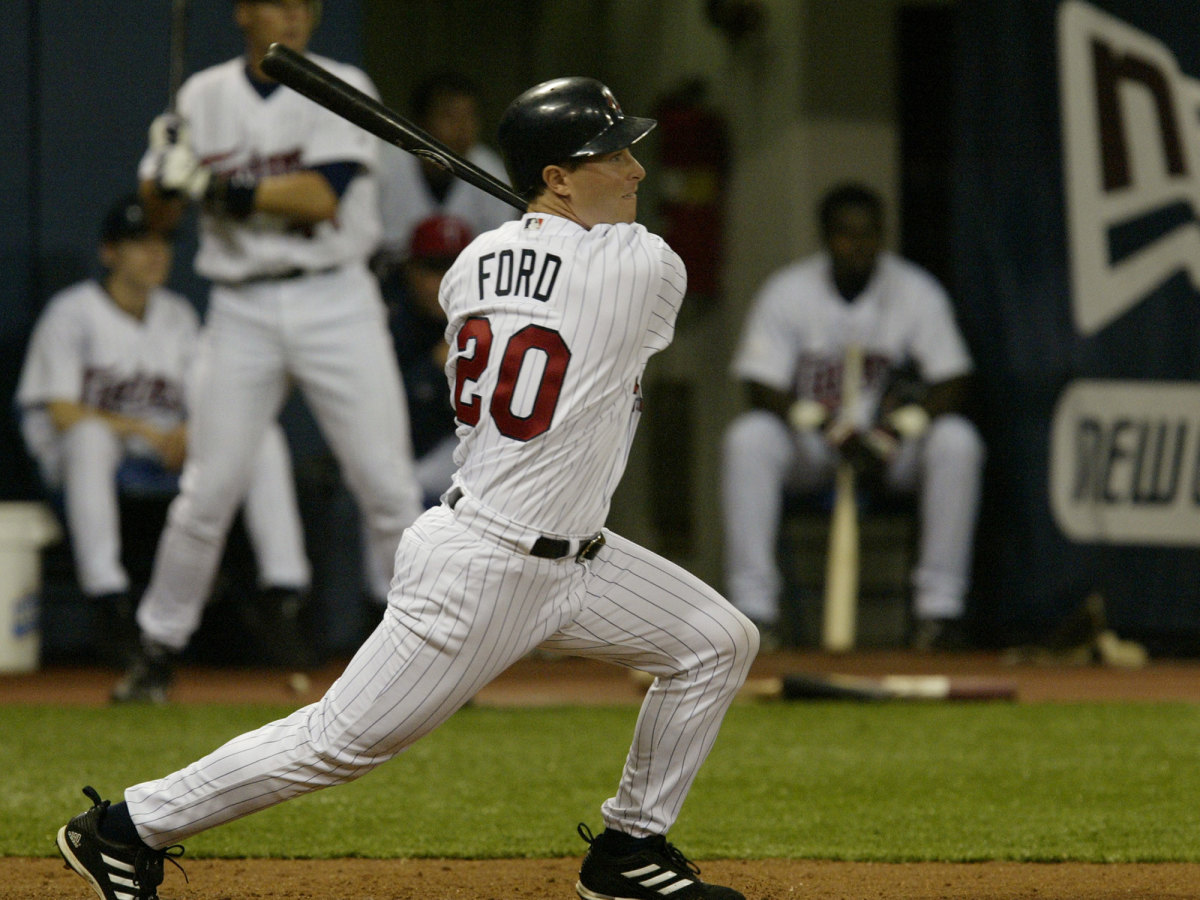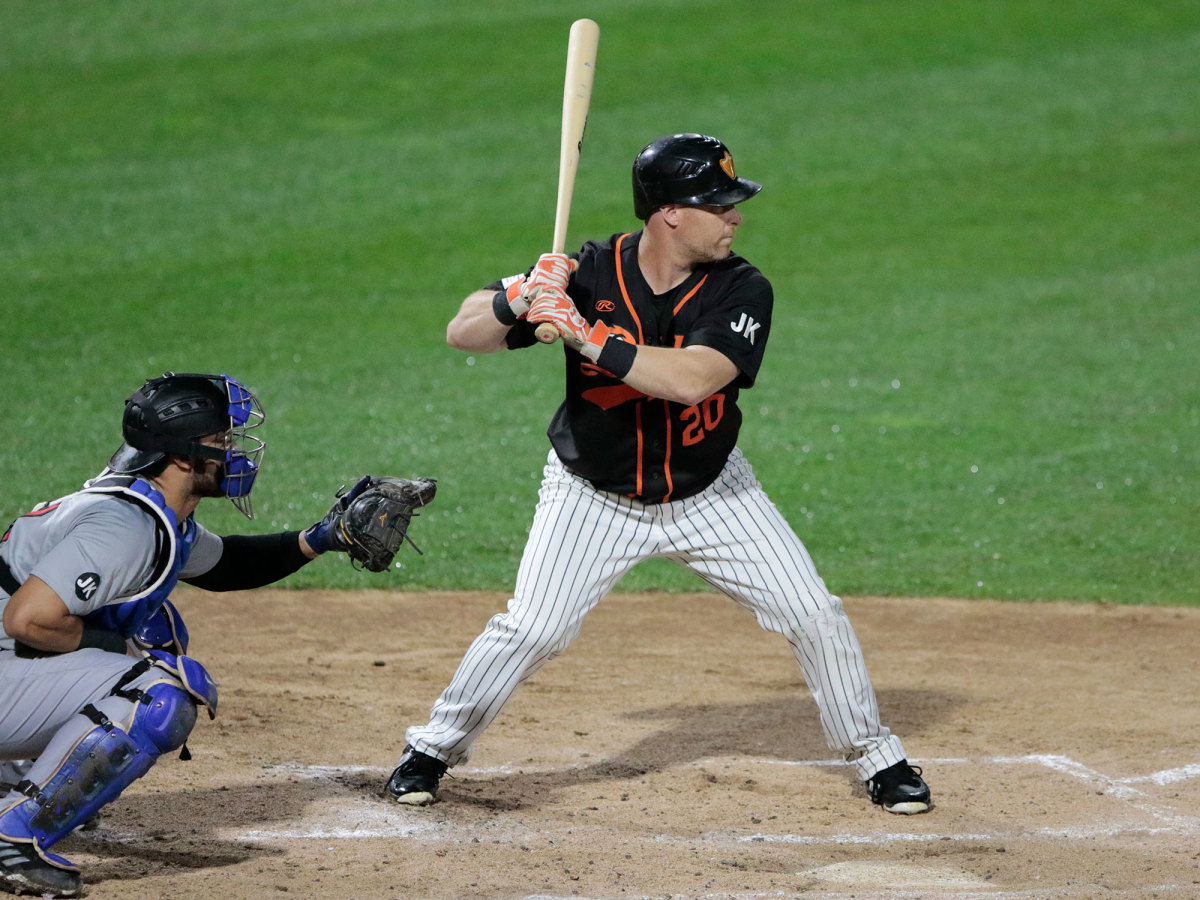At 43, Lew Ford's Never-Ending Career Keeps Rolling as Player-Coach

The first time Lew Ford thought his professional baseball career had reached its end came 1,911 games, 11 teams, five leagues, three countries and 18 years ago. Back then, he was a 24-year-old outfielder buried in the Minnesota Twins’ farm system, frustrated that his first taste of Double A had gone so poorly in 2001. Armed with a bachelor’s degree in math and computer science and living in Austin, Tx., he figured he could get a good-paying job with one of the local tech companies—one that would allow him to settle down and raise a family instead of playing for pennies. But before he gave up on the big leagues, he talked to his wife, Corri, about what the future might hold. They agreed that he’d give baseball one more shot.
“I knew I needed to step it up or do something else,” Ford says. “Something else” never materialized: Nearly two decades later, he remains in the game at 43 years old, cranking away as a player-coach for the Long Island Ducks of the independent Atlantic League. Far past the point when most others would have put away their bats and away from the major league spotlight, Ford continues to churn for as long as his body and mind will let him.
“As far as one more shot to make it to the major leagues, that’s not my goal or whatever at this point in life,” Ford says. “But I do enjoy coaching and I’m still able to [play], and I enjoy it, so I’m just doing what I enjoy right now.”
That Ford is still swinging a bat in organized baseball is a minor miracle, given both his age and his path to this point. A Texas native, football was his calling card until a serious arm injury his freshman year of high school pushed him to baseball. In a pattern that would play out in his professional like, Ford bounced from one college to the next, playing for Texas A&M and a junior college in Oklahoma before winding up at Dallas Baptist. Not that this transient life made him think he was anything other than MLB material. “I played with guys who were drafted, and I felt like I was on at least that level that I could do that,” he says.

A 12th-round draft pick by the Red Sox in 1999, Ford looked to have carved out a role for himself as a hard-nosed reserve outfielder, debuting in 2003 and even earning down-ballot MVP votes as a member of the ‘04 Twins after hitting 15 homers and posting a 114 OPS+ and 4.5 bWAR. But he couldn’t reproduce those numbers, and as he struggled, playing time dried up. Three seasons later, he hit free agency with little momentum.
A few teams came calling that winter, but Ford opted to take the guaranteed money offered by the Hanshin Tigers in Japan, hoping to latch on long-term. “Things go right, you could play a couple of years over there, and guys play over there until they’re older,” he says. “But that didn’t work out.”
Ford enjoyed the atmosphere in Japan—the size of the crowds, the intensity of the games. But he hit a meager .225 for Hanshin in 2008 and returned to U.S. after the season ended. A spring training invite with the Rockies didn’t pan out. At 32, he was once again facing a crossroads, and while he’d been optimistic ahead of his Japan sojourn, this time, he was worried. No one was interested in his services; Ford was at the point where a career falls apart gradually and then all at once.
Then Long Island came calling. One of the bigger clubs in independent league baseball, the Ducks are a familiar stop in the cycle of former major leaguers either flushing out or clinging to a last gasp of hope. The Ducks and their rivals are usually littered with once-notable names, past-their-prime stars and career minor leaguers; the average Atlantic League roster is a mix of random entries from a Baseball America Top 100 list from six years ago and players whose MLB careers were shorter than a fruit fly’s lifespan. Ford, who knew nothing about life in Long Island, was unsure about going there. But a former teammate talked to him about the league, and how it was better than you’d imagine. It helped that, when Ford scanned the roster, he recognized some players; the manager at the time was Hall of Famer Gary Carter. “I could tell there was a high level of professionalism in this organization and league,” he says.
The Ducks ended up being the first rung of Ford’s improbable ladder back to the majors. The Reds signed him late in the year to play for their Triple A squad in 2009. He spent the next season in Mexico, then returned to the Ducks in 2011, hitting well. That and some connections were enough to get him onto Baltimore’s Triple A team in ‘12, and from there, a brief stint with the Orioles. After being left for dead, Ford had somehow crawled back into the big leagues at age 35. He even made it onto Baltimore's postseason roster and went 3 for 8 (.375) against the Yankees.

Sadly, his time with the O’s lasted all of 29 games. The next season, he got hurt, struggled and fell out of their system and back into the independent leagues. Since then, he’s been a mainstay on the Ducks, and a successful one, too. He won the Atlantic League’s MVP award in ‘14, hit .364 in ‘15 as a 38-year-old, clocked 10 homers last year at 41, and has been the hitting coach all the while. This season, he was the player of the month in August at 42. His teammates joke that, if he keeps it up, he’s in danger of getting signed by a major league team. He’ll retort that they have no excuse for their struggles, because if he can succeed at his age, why can’t they at a decade younger?
“I think I’ve almost outgrown the old jokes at this point,” says Ford, the oldest player in the Atlantic League and who has teammates who were born only a few years before he was drafted. “When you’re on the field and playing the game, it doesn’t matter what your age is at that point.”
For now, Ford is going year to year in a sport that seems to change by the day. The Atlantic League has turned into a kind of test kitchen for MLB, which has dumped its schemes for improving pace of play and robot umpires and all the rest work into live game action. Ford tries to roll with the punches, same as he has with all the changes in how the game itself is played—launch angle, spin rate, high-level analytics, evaluation tools that didn’t exist when he debuted nearly two decades ago. “It’s a lot different from the way I came up,” he says, “but the guys still have to hit the ball.”
Ford is still doing that part, even as the players he knows from years gone by hang up their cleats, leaving him wondering how he ended up as one of the last men standing. Regardless, he wants to keep doing this until he can’t any more. No decision has been made on 2020, which would be his 22nd season in professional ball. All he knows is that he’s having fun, and the moment he doesn’t, he’ll go home. “I think I’ll know when it’s time,” he says.
Ford figured his days were numbered nearly 20 years ago. Yet the days keep passing, and with them, more at-bats and games pad an odometer that's well into six digits. As long as the game will have him, Ford will keep playing.
